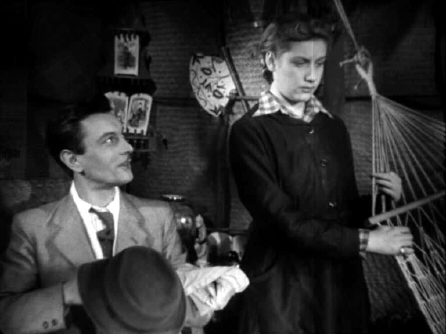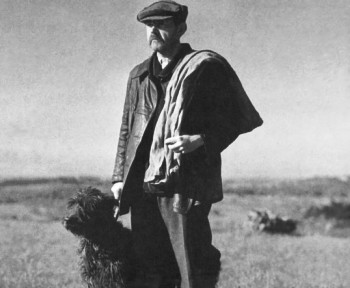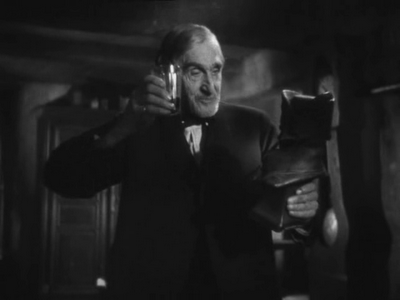
OBSCURE GENIUS
christopher funderburg
jacques becker's GOUPI MAINS ROUGES
page 2
the obscurity: Goupi Mains Rouges

Filmed in 1943 and the first French film to be released in the U.S. following the liberation of France, MGM picked no doubt picked up Goupi Mains Rouges (Goupi Red Hands) because it's a goofy comedy with screwball-ish tendencies. The story follows an urbane young man returning home to his peasant family and their rural inn (American release title: It Happened at the Inn. Incidentally, It basically Happened One Night at the inn). The convoluted plot drops the genteel Parisian into the midst of a whole lot of fussin' and a-feudin' with a side order of unlikely romance. Skirting and eventually defying my imagined clichés of Becker, it harmlessly feints at murder, violence and touched loot; but true to its screwball inflections, that's all more noise than signal. It's a dark film the way George Cukor and Preston Sturges made dark films. In light of Becker's other work, Goupi is something else entirely.
It's not worth it to describe the plot of Goupi in detail - it boils down to this: the Goupi clan fears someone is after their family treasure, a big wad of Francs, and believe a murder has been committed as part of a scheme to steal that money. The visiting city-dweller provides the catalyst for the convoluted plot, but there's not much to it other than a lot of miscommunication on the part of the characters and misdirection on the part of the filmmakers. The opening scenes got my hopes up – they follow the young man's arrival in the small town and a creepy night-time carriage ride down a darkened back road. Becker builds the atmosphere effectively for ten minutes or so and then undoes all his work once our hero reaches the inn: from there on out it's all slapdash farce without a single moment set aside for the quiet, incidental pleasures most memorable in Becker's other work.
Nothing has more limited appeal than regional comedy: think of Satyajit Ray's genuinely tough-to-endure The Adventures of Goopy and Bagha or imagine what people in Senegal would think of Jeff Foxworthy. Even a great director will have a hard time overcoming an idea designed to delight the yokels of a specific time and place. The public's comedic sensibility changes quickly and almost at random, nothing has a shorter shelf-life than "funny" and the ability of culture-specific jokes ("Guys from Montenegro drink beer like this, but guys from Belgrade drink beer like this") to transcend their origin is all but zero. An overwrought comedy about provincial France, Goupi Mains Rouges, unfortunately, suffers to a good extent from exactly these limitations.
 With a film like this, any audience out of the loop is going to spend far too much time trying to read signifiers: is the main character, a fashion designer from Paris, supposed to be an object of ridicule or admiration? The grubby titular hayseed: affably rude or patently boorish? Are they both being set up as types only so the filmmaker can comically undermine expectations? The problem is that Becker initially draws all of the characters comedic shorthand and then never really elaborates, leaving them all as unsatisfying caricatures. I'm sure if I better understood the "types" on display, the assumed details would make everything feel a little more fleshed out. As it stands, everything is simultaneously too "jokey" and opaque to be either fun or interesting. It's a flat film that I can imagine was a hit with French audiences at the time. Provincial France is not so culturally removed from my American background that I was totally befuddled - heck, the NY Times gave it a great review at the time, so it might've been palatable to elitist, Francophilic snobs in the U.S., too – but, for me, a lot of the intended humor was simply lost in the translation.
With a film like this, any audience out of the loop is going to spend far too much time trying to read signifiers: is the main character, a fashion designer from Paris, supposed to be an object of ridicule or admiration? The grubby titular hayseed: affably rude or patently boorish? Are they both being set up as types only so the filmmaker can comically undermine expectations? The problem is that Becker initially draws all of the characters comedic shorthand and then never really elaborates, leaving them all as unsatisfying caricatures. I'm sure if I better understood the "types" on display, the assumed details would make everything feel a little more fleshed out. As it stands, everything is simultaneously too "jokey" and opaque to be either fun or interesting. It's a flat film that I can imagine was a hit with French audiences at the time. Provincial France is not so culturally removed from my American background that I was totally befuddled - heck, the NY Times gave it a great review at the time, so it might've been palatable to elitist, Francophilic snobs in the U.S., too – but, for me, a lot of the intended humor was simply lost in the translation.
Coming nine years before Casque D'Or and eleven before Touchez Pas au Grisbi, Goupi definitely plays like an early work: the narrative flow, editing and cinematography lack the elegance and decisiveness that comes seemingly without effort to those later films. In general, the filmmaking is anonymous and frequently awkward: if you showed this one to me without any context, there would be no reason for me to guess that it was directed by Jacques Becker. It's depressing to write it, but there's absolutely no spark or intelligence here that would lead me to believe the filmmaker is capable of something like Le Trou. Becker's later work is characterized by a stripped-down elegance: their complexity is dependent on their simplicity. Goupi is busy and unfocused. Characters wander in and out the plot; the young fashion designer seems like he's going to be the main character and then disappears for long stretches. Even Goupi Mains Rouge himself never really takes center stage and it's hard to get any sense of where the plot is headed or when it will arbitrarily resolve.
Provincialism aside, the film's most heavy flaws relate to Becker inability to deftly interweave multiple plot strands. Every time he moves on to a new character or situation, he completely loses the thread that led him there. He certainly seems to have learned his lesson at some point, though: the noisy, lurching qualities of Goupi find their complete inverse in his later, better work. Casque D'Or, Grisbi and Le Trou can get away with meandering because their narrative spines are so strong: their forceful plots travel forward with the directness of a train. They have the luxury to linger over small details and evocative moments because their destination is so obvious (and obviously tragic - you're in no hurry to get there, at any rate). It's all Becker can do in Goupi to keep an audience clued in on just what the fuck is happening. I suppose juggling a frenetic jumble is supposed to be part of the fun: everything's moving too quickly and erratically on this wild ride filled with quirky unpredictable characters and confused/confusing mishaps! It's so zany! (in theory). But the actual effect is very different: it's just unclear who characters are and what's supposed to be funny about them.
 If I were being less generous, I could write that the film simply isn't funny and not give it the excuse of culturally crossed-signals. Certainly, there's no indication in Becker's best work that he has any kind of talent for comedy. He lacks Clouzot's acidic wit and wicked irony; he doesn't even have Melville's deadpan flair for reversals of fortune and wry coincidence. A dose of the affability and camaraderie running through his later films might've made Goupi a little more likable, but it sure as shit wouldn't have made it any funnier. With farce, all of the elements and characters need to constantly be played off of each other, constant chaos ratcheted up through miscommunication, mistrust and intransigence – that's the exact opposite of what resonates in Becker's later work. Becker's tin-ear for comedy means that Goupi just ends up being corybantic and tedious; he's much for enjoyable when bringing people together for tragedy than when keeping them apart for laffs.
If I were being less generous, I could write that the film simply isn't funny and not give it the excuse of culturally crossed-signals. Certainly, there's no indication in Becker's best work that he has any kind of talent for comedy. He lacks Clouzot's acidic wit and wicked irony; he doesn't even have Melville's deadpan flair for reversals of fortune and wry coincidence. A dose of the affability and camaraderie running through his later films might've made Goupi a little more likable, but it sure as shit wouldn't have made it any funnier. With farce, all of the elements and characters need to constantly be played off of each other, constant chaos ratcheted up through miscommunication, mistrust and intransigence – that's the exact opposite of what resonates in Becker's later work. Becker's tin-ear for comedy means that Goupi just ends up being corybantic and tedious; he's much for enjoyable when bringing people together for tragedy than when keeping them apart for laffs.
<<Previous Page 1 2 Next Page>>
home about contact us featured writings years in review film productions
All rights reserved The Pink Smoke © 2009